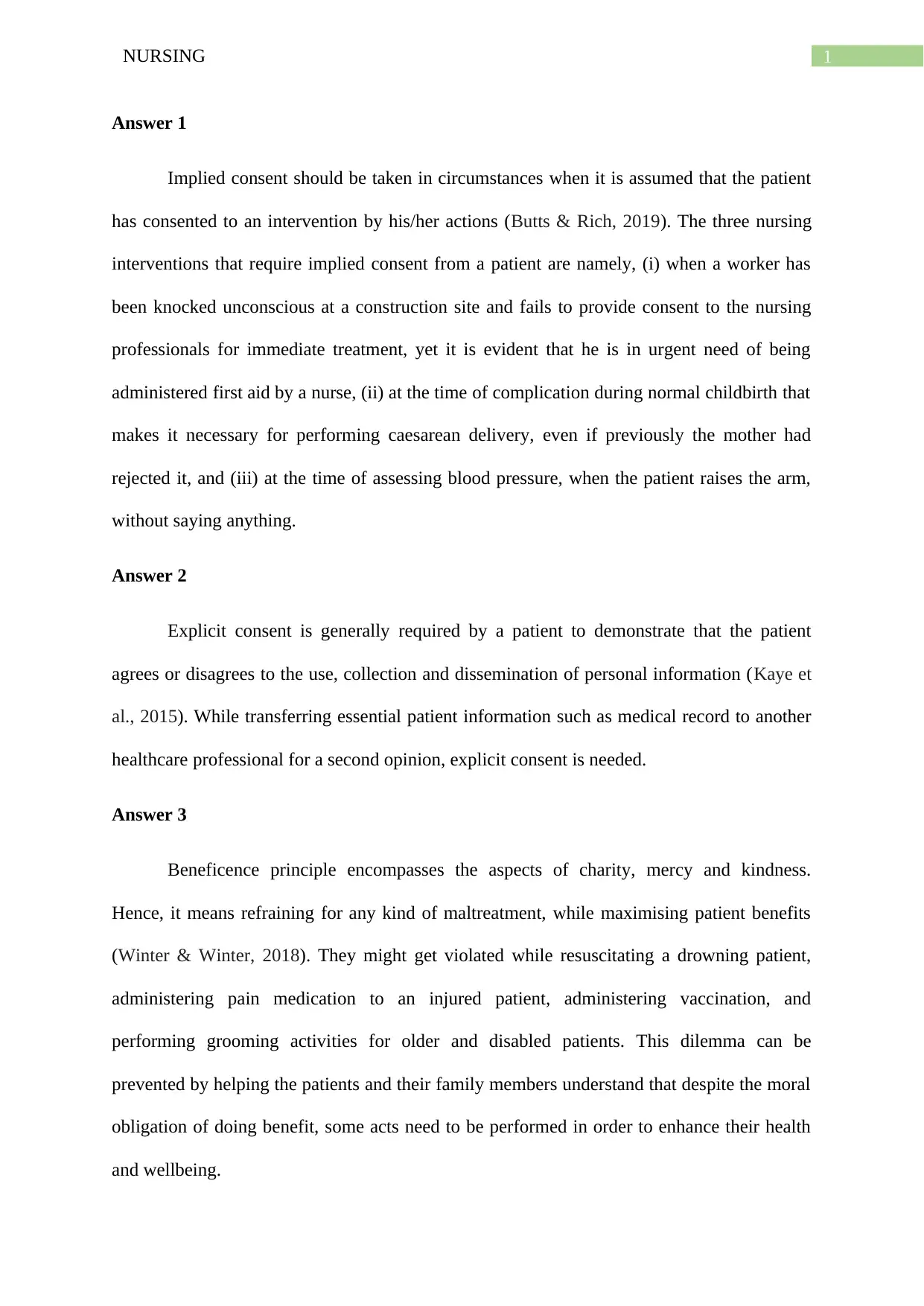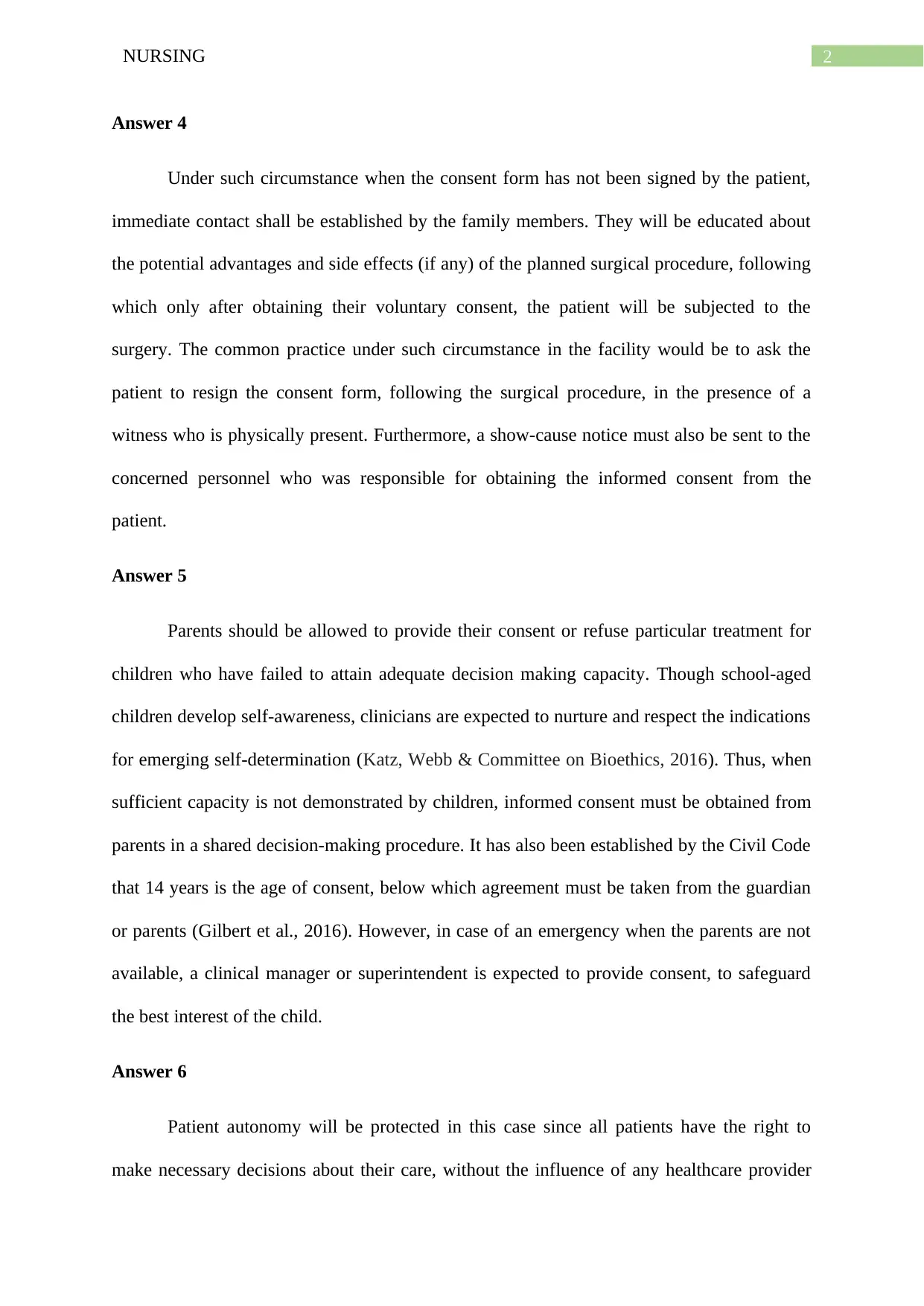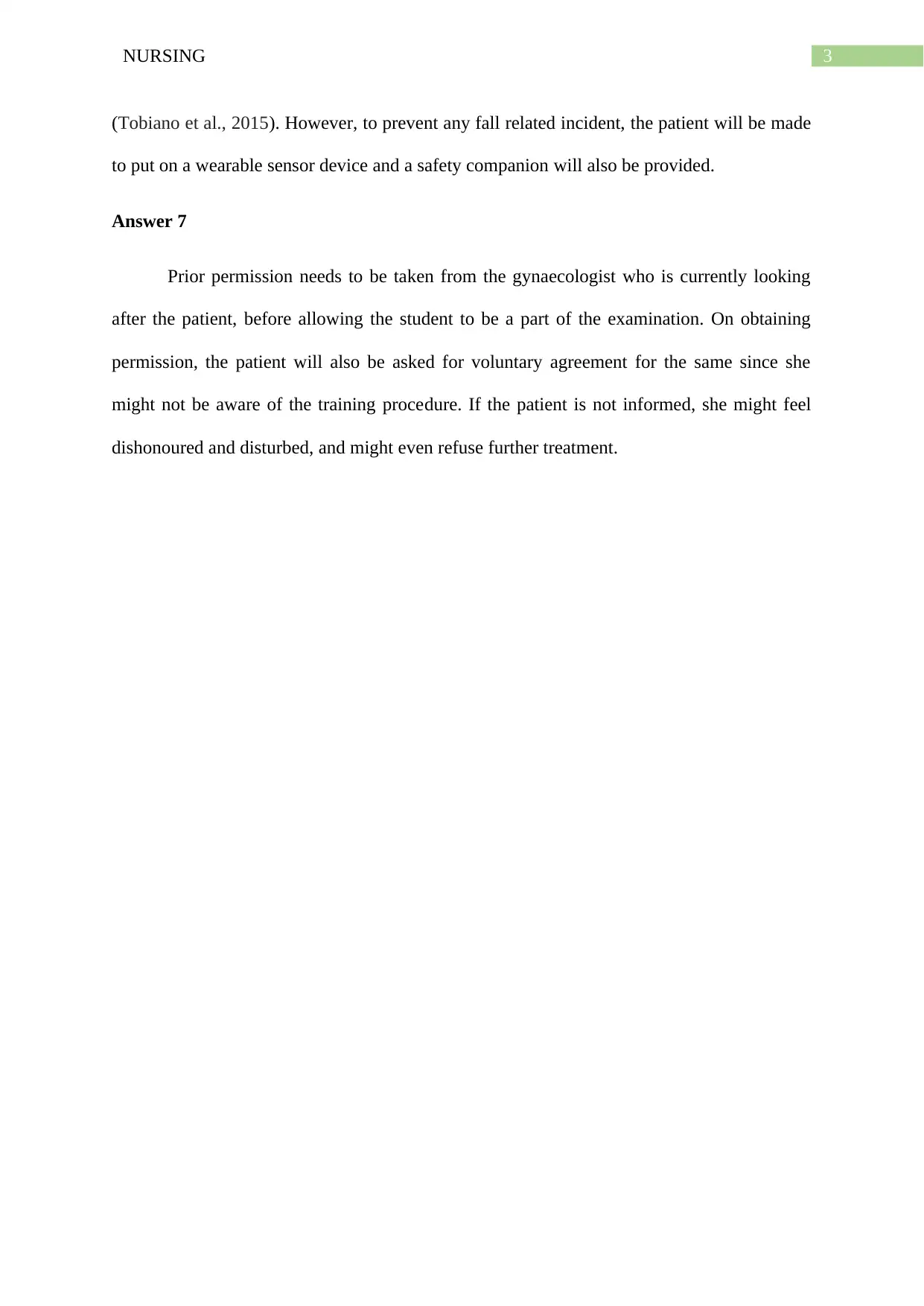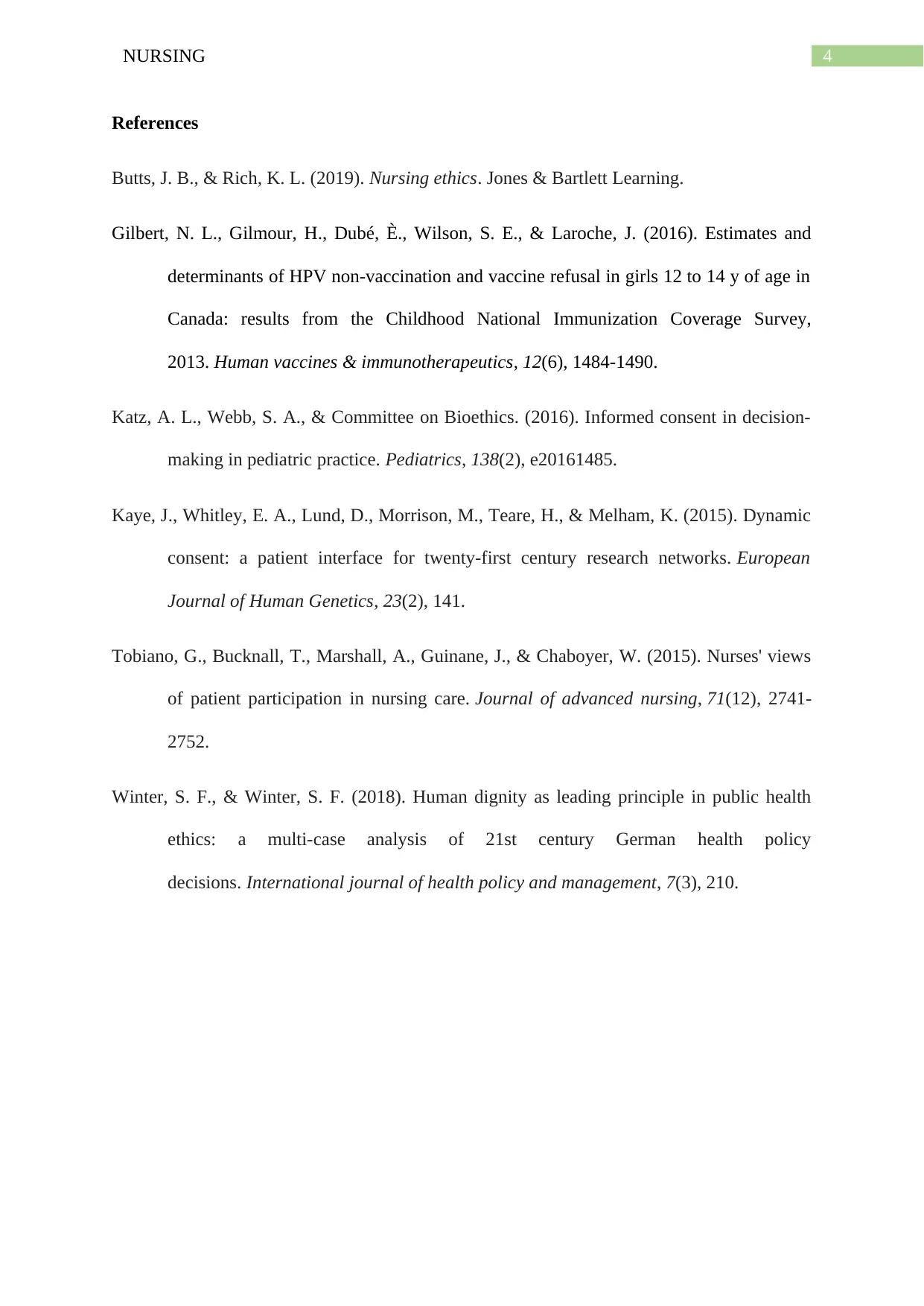Case Study: Ethical and Legal Considerations in Nursing
VerifiedAdded on 2022/10/06
|5
|1042
|18
Case Study
AI Summary
This case study explores ethical and legal principles in nursing practice, addressing scenarios related to informed consent, patient autonomy, and beneficence. The assignment analyzes situations where implied and explicit consent are necessary, such as in emergency treatments and the transfer of patient information. It examines ethical dilemmas, like balancing patient benefit with potential harm, and provides solutions for obtaining consent from patients and their families, especially in cases involving minors or when patients cannot provide consent themselves. The study also considers how to protect patient autonomy while ensuring safety, and the importance of obtaining consent from patients before including them in training procedures. The assignment draws on relevant literature to support its arguments and provides practical guidance for nurses navigating ethical and legal challenges in their profession.

Running head: NURSING
Case study, ethics and law for nurses
Name of the Student
Name of the University
Author Note
Case study, ethics and law for nurses
Name of the Student
Name of the University
Author Note
Paraphrase This Document
Need a fresh take? Get an instant paraphrase of this document with our AI Paraphraser

1NURSING
Answer 1
Implied consent should be taken in circumstances when it is assumed that the patient
has consented to an intervention by his/her actions (Butts & Rich, 2019). The three nursing
interventions that require implied consent from a patient are namely, (i) when a worker has
been knocked unconscious at a construction site and fails to provide consent to the nursing
professionals for immediate treatment, yet it is evident that he is in urgent need of being
administered first aid by a nurse, (ii) at the time of complication during normal childbirth that
makes it necessary for performing caesarean delivery, even if previously the mother had
rejected it, and (iii) at the time of assessing blood pressure, when the patient raises the arm,
without saying anything.
Answer 2
Explicit consent is generally required by a patient to demonstrate that the patient
agrees or disagrees to the use, collection and dissemination of personal information (Kaye et
al., 2015). While transferring essential patient information such as medical record to another
healthcare professional for a second opinion, explicit consent is needed.
Answer 3
Beneficence principle encompasses the aspects of charity, mercy and kindness.
Hence, it means refraining for any kind of maltreatment, while maximising patient benefits
(Winter & Winter, 2018). They might get violated while resuscitating a drowning patient,
administering pain medication to an injured patient, administering vaccination, and
performing grooming activities for older and disabled patients. This dilemma can be
prevented by helping the patients and their family members understand that despite the moral
obligation of doing benefit, some acts need to be performed in order to enhance their health
and wellbeing.
Answer 1
Implied consent should be taken in circumstances when it is assumed that the patient
has consented to an intervention by his/her actions (Butts & Rich, 2019). The three nursing
interventions that require implied consent from a patient are namely, (i) when a worker has
been knocked unconscious at a construction site and fails to provide consent to the nursing
professionals for immediate treatment, yet it is evident that he is in urgent need of being
administered first aid by a nurse, (ii) at the time of complication during normal childbirth that
makes it necessary for performing caesarean delivery, even if previously the mother had
rejected it, and (iii) at the time of assessing blood pressure, when the patient raises the arm,
without saying anything.
Answer 2
Explicit consent is generally required by a patient to demonstrate that the patient
agrees or disagrees to the use, collection and dissemination of personal information (Kaye et
al., 2015). While transferring essential patient information such as medical record to another
healthcare professional for a second opinion, explicit consent is needed.
Answer 3
Beneficence principle encompasses the aspects of charity, mercy and kindness.
Hence, it means refraining for any kind of maltreatment, while maximising patient benefits
(Winter & Winter, 2018). They might get violated while resuscitating a drowning patient,
administering pain medication to an injured patient, administering vaccination, and
performing grooming activities for older and disabled patients. This dilemma can be
prevented by helping the patients and their family members understand that despite the moral
obligation of doing benefit, some acts need to be performed in order to enhance their health
and wellbeing.

2NURSING
Answer 4
Under such circumstance when the consent form has not been signed by the patient,
immediate contact shall be established by the family members. They will be educated about
the potential advantages and side effects (if any) of the planned surgical procedure, following
which only after obtaining their voluntary consent, the patient will be subjected to the
surgery. The common practice under such circumstance in the facility would be to ask the
patient to resign the consent form, following the surgical procedure, in the presence of a
witness who is physically present. Furthermore, a show-cause notice must also be sent to the
concerned personnel who was responsible for obtaining the informed consent from the
patient.
Answer 5
Parents should be allowed to provide their consent or refuse particular treatment for
children who have failed to attain adequate decision making capacity. Though school-aged
children develop self-awareness, clinicians are expected to nurture and respect the indications
for emerging self-determination (Katz, Webb & Committee on Bioethics, 2016). Thus, when
sufficient capacity is not demonstrated by children, informed consent must be obtained from
parents in a shared decision-making procedure. It has also been established by the Civil Code
that 14 years is the age of consent, below which agreement must be taken from the guardian
or parents (Gilbert et al., 2016). However, in case of an emergency when the parents are not
available, a clinical manager or superintendent is expected to provide consent, to safeguard
the best interest of the child.
Answer 6
Patient autonomy will be protected in this case since all patients have the right to
make necessary decisions about their care, without the influence of any healthcare provider
Answer 4
Under such circumstance when the consent form has not been signed by the patient,
immediate contact shall be established by the family members. They will be educated about
the potential advantages and side effects (if any) of the planned surgical procedure, following
which only after obtaining their voluntary consent, the patient will be subjected to the
surgery. The common practice under such circumstance in the facility would be to ask the
patient to resign the consent form, following the surgical procedure, in the presence of a
witness who is physically present. Furthermore, a show-cause notice must also be sent to the
concerned personnel who was responsible for obtaining the informed consent from the
patient.
Answer 5
Parents should be allowed to provide their consent or refuse particular treatment for
children who have failed to attain adequate decision making capacity. Though school-aged
children develop self-awareness, clinicians are expected to nurture and respect the indications
for emerging self-determination (Katz, Webb & Committee on Bioethics, 2016). Thus, when
sufficient capacity is not demonstrated by children, informed consent must be obtained from
parents in a shared decision-making procedure. It has also been established by the Civil Code
that 14 years is the age of consent, below which agreement must be taken from the guardian
or parents (Gilbert et al., 2016). However, in case of an emergency when the parents are not
available, a clinical manager or superintendent is expected to provide consent, to safeguard
the best interest of the child.
Answer 6
Patient autonomy will be protected in this case since all patients have the right to
make necessary decisions about their care, without the influence of any healthcare provider
⊘ This is a preview!⊘
Do you want full access?
Subscribe today to unlock all pages.

Trusted by 1+ million students worldwide

3NURSING
(Tobiano et al., 2015). However, to prevent any fall related incident, the patient will be made
to put on a wearable sensor device and a safety companion will also be provided.
Answer 7
Prior permission needs to be taken from the gynaecologist who is currently looking
after the patient, before allowing the student to be a part of the examination. On obtaining
permission, the patient will also be asked for voluntary agreement for the same since she
might not be aware of the training procedure. If the patient is not informed, she might feel
dishonoured and disturbed, and might even refuse further treatment.
(Tobiano et al., 2015). However, to prevent any fall related incident, the patient will be made
to put on a wearable sensor device and a safety companion will also be provided.
Answer 7
Prior permission needs to be taken from the gynaecologist who is currently looking
after the patient, before allowing the student to be a part of the examination. On obtaining
permission, the patient will also be asked for voluntary agreement for the same since she
might not be aware of the training procedure. If the patient is not informed, she might feel
dishonoured and disturbed, and might even refuse further treatment.
Paraphrase This Document
Need a fresh take? Get an instant paraphrase of this document with our AI Paraphraser

4NURSING
References
Butts, J. B., & Rich, K. L. (2019). Nursing ethics. Jones & Bartlett Learning.
Gilbert, N. L., Gilmour, H., Dubé, È., Wilson, S. E., & Laroche, J. (2016). Estimates and
determinants of HPV non-vaccination and vaccine refusal in girls 12 to 14 y of age in
Canada: results from the Childhood National Immunization Coverage Survey,
2013. Human vaccines & immunotherapeutics, 12(6), 1484-1490.
Katz, A. L., Webb, S. A., & Committee on Bioethics. (2016). Informed consent in decision-
making in pediatric practice. Pediatrics, 138(2), e20161485.
Kaye, J., Whitley, E. A., Lund, D., Morrison, M., Teare, H., & Melham, K. (2015). Dynamic
consent: a patient interface for twenty-first century research networks. European
Journal of Human Genetics, 23(2), 141.
Tobiano, G., Bucknall, T., Marshall, A., Guinane, J., & Chaboyer, W. (2015). Nurses' views
of patient participation in nursing care. Journal of advanced nursing, 71(12), 2741-
2752.
Winter, S. F., & Winter, S. F. (2018). Human dignity as leading principle in public health
ethics: a multi-case analysis of 21st century German health policy
decisions. International journal of health policy and management, 7(3), 210.
References
Butts, J. B., & Rich, K. L. (2019). Nursing ethics. Jones & Bartlett Learning.
Gilbert, N. L., Gilmour, H., Dubé, È., Wilson, S. E., & Laroche, J. (2016). Estimates and
determinants of HPV non-vaccination and vaccine refusal in girls 12 to 14 y of age in
Canada: results from the Childhood National Immunization Coverage Survey,
2013. Human vaccines & immunotherapeutics, 12(6), 1484-1490.
Katz, A. L., Webb, S. A., & Committee on Bioethics. (2016). Informed consent in decision-
making in pediatric practice. Pediatrics, 138(2), e20161485.
Kaye, J., Whitley, E. A., Lund, D., Morrison, M., Teare, H., & Melham, K. (2015). Dynamic
consent: a patient interface for twenty-first century research networks. European
Journal of Human Genetics, 23(2), 141.
Tobiano, G., Bucknall, T., Marshall, A., Guinane, J., & Chaboyer, W. (2015). Nurses' views
of patient participation in nursing care. Journal of advanced nursing, 71(12), 2741-
2752.
Winter, S. F., & Winter, S. F. (2018). Human dignity as leading principle in public health
ethics: a multi-case analysis of 21st century German health policy
decisions. International journal of health policy and management, 7(3), 210.
1 out of 5
Related Documents
Your All-in-One AI-Powered Toolkit for Academic Success.
+13062052269
info@desklib.com
Available 24*7 on WhatsApp / Email
![[object Object]](/_next/static/media/star-bottom.7253800d.svg)
Unlock your academic potential
Copyright © 2020–2026 A2Z Services. All Rights Reserved. Developed and managed by ZUCOL.





